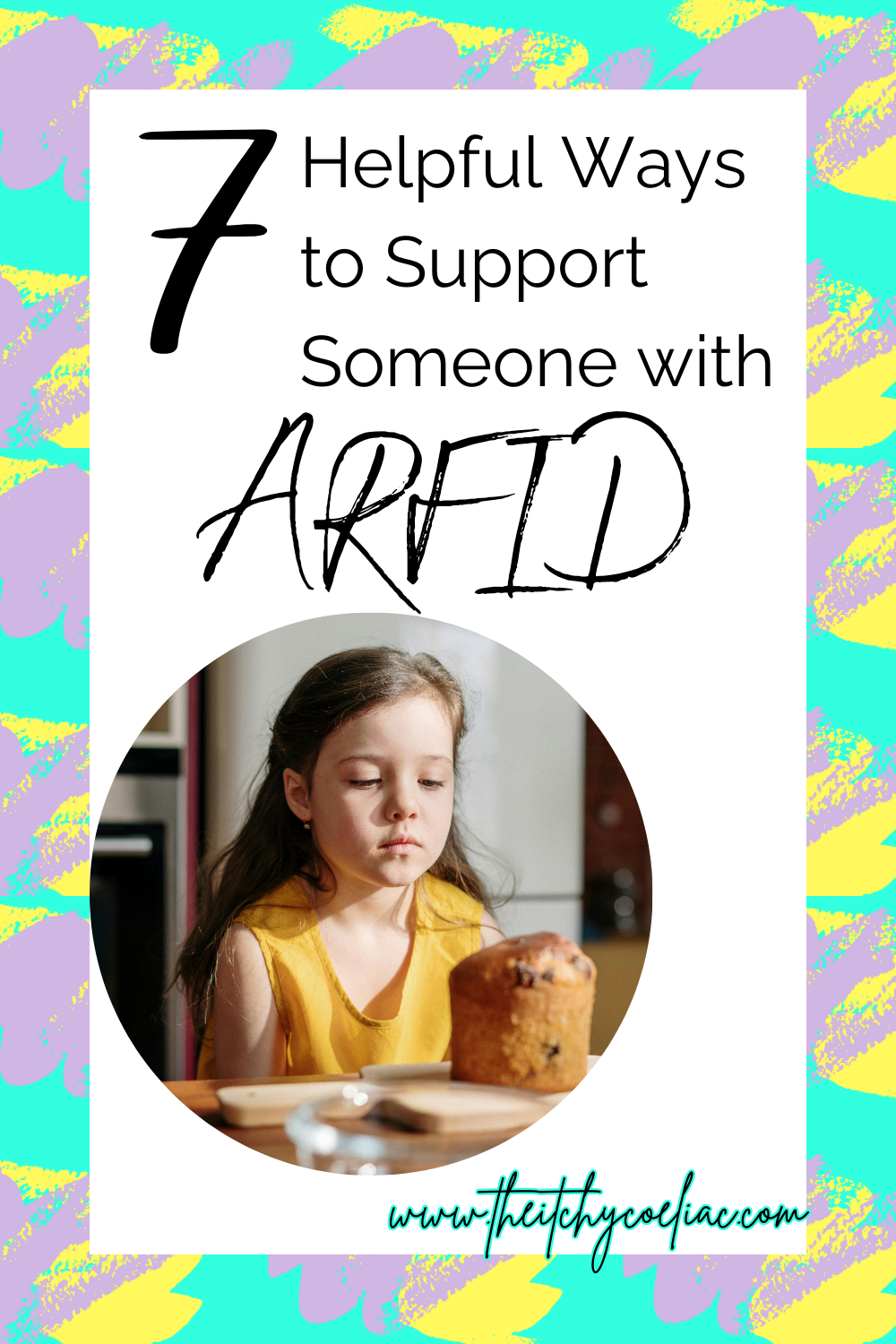Do you have someone in your life that’s dealing with ARFID? Or do you have it yourself and you’re looking for the perfect resources to show relatives, friends, or your partner? Then this post about how to support someone with ARFID is for you.
Why not pin it for later?

When it comes to having an eating disorder, things can be pretty tough. We all need people in our lives that support us and make us feel (for lack of a better word) ‘normal’.
I know first hand that trying to get someone in your life to understand ARFID can be difficult. A lot of the time we don’t completely understand it ourselves. So here’s 7 helpful ways that others can support those of us with ARFID!
1. Be flexible when it comes to public events that include food!
For those of us with ARFID, a public event such as a birthday or a gathering where food is involved, can cause a lot of stress. As soon as we receive that invite our minds go into hyperdrive with worry – even if that event is months away!
Will there be any of my safe foods there? How do I get around having to explain to people why I’m not eating?
Those are just some of the questions that we’ll keep ourselves awake with for the next few weeks leading up to the event.
One way that someone can support us in this, especially if they are the host, is just by being a little bit flexible.
If you’re already aware of someone’s ARFID, maybe ask them beforehand what their safe foods are. Check to see if there’s anything you can make sure to have available for them.
If you’re the host and someone asks if they can bring their own food to the event, do not be affronted by this. It’s not a slight or anything against you personally – I’m sure your quiche Lorraine is absolutely delightful, Janet.
But if we’re able to bring our own food, we know that at the very least we’ll have a back up meal if there isn’t anything at the event that we will eat.
It gives us that peace of mind and alleviates the hassle from the host of having to provide a special selection just for us ARFID peeps.

Another thing that can be very helpful if we’re going to be eating out, is to have the menu. If you’re arranging a meal out and you have someone in that group that has ARFID (or any food intolerances really) send out a menu ahead of time.
This can be super useful as we can read it at our leisure and work out what we can eat or what we might struggle with. Then we can plan ahead!
2. Don’t take it personally if we’re not eating!
One thing I’ve always noticed when it came to ARFID was how much it seemed to bother other people when I wouldn’t eat something.
Somehow when we say we don’t like something it comes across to the other person as ‘I hate you and your food is the worst food on the planet’.
I’m overexaggerating, of course, but that is how it can feel a lot of the time!
I remember being younger and my grandma would reveal some dish she’d prepared that she was super proud of and couldn’t wait for everyone to try. I’d throw my mum that terrified look and mumble to the rest of the table about how I didn’t like it.
And it was always met with the same response:
“But you haven’t tried it?”
“It’s just like [insert safe food here] but a bit different!”
“Grandma has worked so hard on it all day, can’t you just eat some?”
The guilt that came from knowing that I could not simply eat some was horrible.

So how can you make sure not to make someone with ARFID feel like that?
Well, don’t take it personal if we decline to try something you’ve made. We’re not looking to upset you but we just know that no matter how much ‘like other foods’ it is, we won’t be able to eat it.
ARFID is a disorder that centres around anxiety when it comes to food. By pushing and making us feel bad that Grandma’s been in the kitchen cooking all day, you’re doing nothing to ease that anxiety.
The guilt trip and the pressure just makes it all worse and so we’re even less inclined to attempt to try whatever food it is.
The best thing you can do is simply accept it and move on.
3. No Means No!
This is a biggie, okay? If you ask us to try something new and we say no, please don’t try and fight us on it.
I understand that usually people are just trying to help or they feel like they need to make us eat (especially if they are a parent). But in my experience, all this does is make us more anxious and less likely to want to attempt to try new foods around you.
It also applies if we’re offered something and we say “I don’t like it”.
Here’s a list of things not to respond to that comment with:
- You’ve never tried it
- You’ll probably like it
- Just have a little bit
- Can’t you just eat it
- But you like [so and so], why wouldn’t you like this?
- You don’t know what you’re missing out on
These are just a few examples, I have a whole post all about things you shouldn’t say to someone with ARFID!
My point is that you can’t tell someone how they feel about food. You don’t have their taste buds, you don’t have their thoughts and you don’t have their eating disorder.
Again, the best advice I can give is this: if we say no, just accept it and move on.
4. Ease the pressure when it comes to food!
My fourth point does kind of tie into the third one. (Actually thinking about it, all of these points intersect in some way!)
One of the best ways to support someone with ARFID is to ensure that where food is involved, pressure is nowhere to be found.
We need to know that there are no expectations and no requirements when we sit down to eat. That way we can enjoy our meal together with people we care about.
It’s a weird kind of metaphor that I have in my head, but I’m going to run with it so stick with me here!
When I sit down at the table and there are expectations that I have to try something new or I must eat everything on my plate, it can feel like I’ve got a giant weight on my chest. Whoever is sitting at the table is (metaphorically) sat on that weight.
They’re all staring down at me and waiting for me to try that piece of broccoli that’s been stuck on my fork for the past half hour. And I’m looking up at them, like “I can’t even breathe never mind eat!”

They just keep staring at me so I somehow manage to force the broccoli to my mouth. One by one they all jump off the weight, now that they’re happy I ate something. But that weight still weighs the same and it’s still sitting on my chest.
So even though they’re happier now that I’ve eaten something or tried something, I still feel that pressure. I still feel the panic of not being able to breathe and I am now forever going to associate that piece of broccoli with this anxiety filled moment.
That’s why it’s so important that when trying to support someone with ARFID, there is no pressure applied.
Here’s a couple of things you can do at meal times to make sure that we ARFID people feel at ease:
- If you are encouraging them to try new foods, ensure that their safe food is also available. Then they know that if all else fails there is an option that is safe for them.
- Keep the focus away from the food (and the person!). Stick the telly on, go on a long rant about your day, anything that might distract them from what they’re doing and keep the attention off ‘trying something new’.
- Please don’t act disappointed or let down if they’re unable to manage it. Trust me, they’re doing their best and it will only make them feel worse.
- Try not to comment on what/how much they’re eating. If something does need to be said – make it positive!
That brings me nicely to my next suggestion of how to support someone that has ARFID…
5. Reassurance and Positivity!
It’s a proven idea that positive reinforcement can work wonders, and this applies to ARFID too!
When we are given words of positivity in regards to food or trying new foods, it can be a real confidence booster. With this burst of confidence we may find ourselves able to do things we were unsure about before. Like trying that new food!
By building up our confidence you’re letting us know that we have it within us to overcome the challenges that ARFID puts in our way.
You’re also creating a sense of support and safety which is vital when dealing with an eating disorder like ARFID. As it’s heavily anxiety based, knowing that we are in a safe environment and have people around us that are supportive, it works well to help put us at ease.
The other benefit of positivity and reassurance, is that it promotes those little wins.
Not every food exposure will be a successful one and not every food is going to go on our safe list. But that doesn’t mean the little steps we take shouldn’t be praised.
Maybe all we’ve managed is to take a single bite of something. Or we only managed a tiny lick. Or all we did was sniff it.
These are all still things that are positive steps forward and should be celebrated. If it’s something that we would never have done before, then that’s a milestone reached!
By being positive about those little interactions with foods, it can give us a sense of accomplishment. It makes us more eager to reach our goals and push to do a little more the next time.
6. Educate Yourself
One of the best ways to learn how to support someone with ARFID is to educate yourself on what exactly ARFID is. By doing that, you can get a better understanding of why we might do some of the things we do.
A good place to start would be by reading articles and stories from reputable sources. While there isn’t miles and miles of research into ARFID, there are a few good places you can find information. The internet is your best friend in this instance!

My first recommendation would be to check out my post ‘What is ARFID? Everything You Need To Know’.
I know, I know it’s a little cheeky to promote my own post but I only do it because I really do believe it can help. I wrote it with the intention of giving people a better understanding of what ARFID is so it’s the perfect place to start!
Another website I highly recommend would be ARFID Awareness UK.
They’re the UK’s only (yes, only!) registered charity that promotes the awareness of Avoidant Restrictive Food Intake Disorder. They’re a great not-for-profit that aim to provide up to date research, relevant information and support for parents and carers of those with ARFID.
The National Eating Disorder Association is also a good resource for finding out more about ARFID.
Now that it is officially recognised as an eating disorder there is slowly but surely more information coming to light to help educate and bring awareness to ARFID.
A great way to try and keep yourself in the know about ARFID and what it’s like to have it, is by joining support groups on places like Facebook.
Joining support groups is perfect if you’re looking to get that personal experience from real people that have the eating disorder. It also gives you the opportunity to ask questions and get insightful answers. In a group setting like that it makes you realise that you’re not alone and there are solutions and ideas out there to help make life with ARFID a little easier.
7. Advocate for Awareness
Following from my last point, advocating for more awareness of ARFID is such a helpful way of showing your support!
At the moment, there is not a whole lot of understanding of this particular eating disorder. There is still a lot of misconception and stigma surrounding it.
How many times have you heard the phrase ‘they’re just a picky eater’? Or ‘they’re just spoiled’?
It’s massively important that we dispel those misconceptions and bring a clearer understanding to ARFID.
Some of the ways you can advocate for ARFID awareness are:
- Consider sharing your own story! If you are a parent or carer of someone with ARFID, it can be helpful to others like you to hear your story. Sharing tips and advice can make it that much easier to communicate and support each other.
- Utilise social media! The power of social media is incredible these days. It makes sense to make use of it as much as possible. Share informative articles and posts to help spread the word to your family and friends. Every person educated is a step in the right direction.
- Support research efforts! Research into ARFID and the appropriate way to treat it is incredibly lacking. You can keep up to date on the latest research, advocate for increased funding and maybe even take part in studies. It all goes a long way into the advancement of understanding and treating ARFID.
- Lead by example! By being a visible and vocal advocate for those with ARFID, you inspire others to do the same. Not only that, but you show that person in your life that has ARFID that you support them. Trust me, that’s something we greatly appreciate!
If you can do some of these to help advocate for ARFID awareness, you can reduce the stigma surrounding it. You will also increase understanding and be better equipped to provide a more understanding and inclusive environment for those in your life living with the disorder.
So those are my 7 helpful ways to support someone with ARFID!
- Be flexible when it comes to public events involving food
- Don’t take it personally if we’re not eating
- No means no – do not force us to try things
- Ease the pressure around food
- Show only positivity and reassurance
- Educate yourself
- Advocate for ARFID awareness
What do you think? If you have ARFID, what are some of the supportive things people in your life do? Let me know in the comments!






